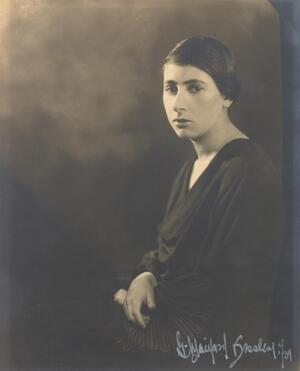Babette Deutsch
Author and translator Babette Deutsch, 1939. Manuscripts and Archives Division, The New York Public Library.
In her poetry, novels, and translations, Babette Deutsch interwove elements of vastly different cultures and times, from the Bible and Shakespeare to Russian and Japanese literature. Deutsch first book of poems, Banners, was published in 1919. Her second book of poetry, Honey Out of a Rock, dealt with Jewish and biblical subjects and incorporated elements of haiku and imagism. She translated Pushkin and other Russian poets and wrote literary criticism on Shakespeare and Coleridge as well as modern poets. Her knowledge of her field was highly regarded, and she served as a consultant for the Library of Congress from 1960 to 1966. She lectured at the New School briefly before becoming a professor at Columbia University, where she taught for almost thirty years, retiring in 1971.
“How to sustain the miracle/Of being, that like a muted bell,/Or like some ocean-breathing shell,/Quivers, intense and still?” asked Babette Deutsch in her poem “Quandary.” Questions surrounding the miracle of life formed an important part of Babette Deutsch’s poetry. She also published many novels and works of literary criticism, but she is best known for her poetry, which was greatly influenced by Jewish themes and culture.
Early Life and Education
Babette Deutsch was born in New York City on September 22, 1895, to parents of German Jewish descent, Michael and Melanie (Fisher) Deutsch. Except for brief trips abroad, she lived in New York City all her life. Deutsch attended Barnard College at Columbia University, where she received her B.A. in 1917. While still an undergraduate, she began to publish her verse in various magazines.
Literary Works and Teaching
In 1919, Deutsch’s first volume of poetry was published, entitled Banners. Her second book of verse, Honey Out of a Rock, was published in 1928. This second work dealt with many biblical themes and reflected the influence of Jewish culture, as well as imagism and Japanese haiku.
On April 28, 1921, the young poet married Avraham Yarmolinsky, a writer of Russian Jewish descent. They had two sons, Adam and Michael, and their marriage marked the beginning of a long and successful creative partnership. The couple translated several works of Russian poetry together, including the works of Pushkin. Deutsch, who was fluent in German, also translated the works of Rilke into English.
Deutsch was the author of several novels, among them A Brittle Heaven (1926), In Such a Night (1927), and The Mask of Silenus (1933). Her other literary contributions include children’s novels, such as I Often Wish (1966) and Tales of Faraway Folk (1963). She was also well known as a literary critic, publishing many essays on modern poetry and editing the poems of Shakespeare (1946) and Samuel Taylor Coleridge (1967).
Deutsch was a well-respected educator. She lectured at the New School for Social Research from 1933 to 1935, and at Columbia University from 1944 to 1971. She also worked for two years as a lecturer at the Poetry Center of the Young Men’s Hebrew Association in New York City.
Her committee work was an integral part of her role as a writer and teacher. She was a member of the advisory board for the National Book Committee, secretary for the PEN National Institute of Arts and Letters, as well as chancellor for the Academy of American Poets. She was a consultant for the Library of Congress from 1960 to 1966.
Babette Deutsch was the recipient of many honors and awards throughout her life. Her poetry won much acclaim early in her career. In 1926, The Nation awarded her its Poetry Prize. This was followed by a Julia Ellsworth Ford Foundation Prize for her critical work on Walt Whitman. In 1946, Columbia University bestowed upon her an honorary doctorate in literature, and her alma mater later recognized her as a distinguished alumna in 1977.
Jewish Involvement
Babette Deutsch was one of the gifted women artists of her era who made a significant contribution to the Jewish community. Not only did she donate her time to organizations like the YMHA, but she also used her poetry as a medium for paying homage to her heritage. Deutsch was sensitive to the precarious and tragic situation of the Jews during the Holocaust. Her final three books of verse deal with her rage against the destruction and horror of World War II. Her poems about war also try to make some sense out of the evils of humankind: “A sage once said the mind of God forgets/Evil that men remember having done, as it remembers/The good that men do and forget.”
Babette Deutsch died on November 13, 1982.
Selected Works
Banners (1919).
A Brittle Heaven (1926).
Collected Poems, 1919–1962 (1963).
The Collected Poems of Babette Deutsch (1969).
Honey Out of a Rock (1928).
In Such a Night (1927).
I Often Wish (1966).
The Mask of Silenus (1933).
Tales of Faraway Folk (1963).
American Women Writers. Vol. 1. Edited by Lina Maniero (1979)
BEOAJ; Contemporary Authors. Vols. 1–4. Edited by James M. Etheridge and Barbara Kopala (1962).
EJ.
Obituary. NYTimes, November 15, 1982.
UJE; WWIAJ (1928, 1938)WWWIA 8.



